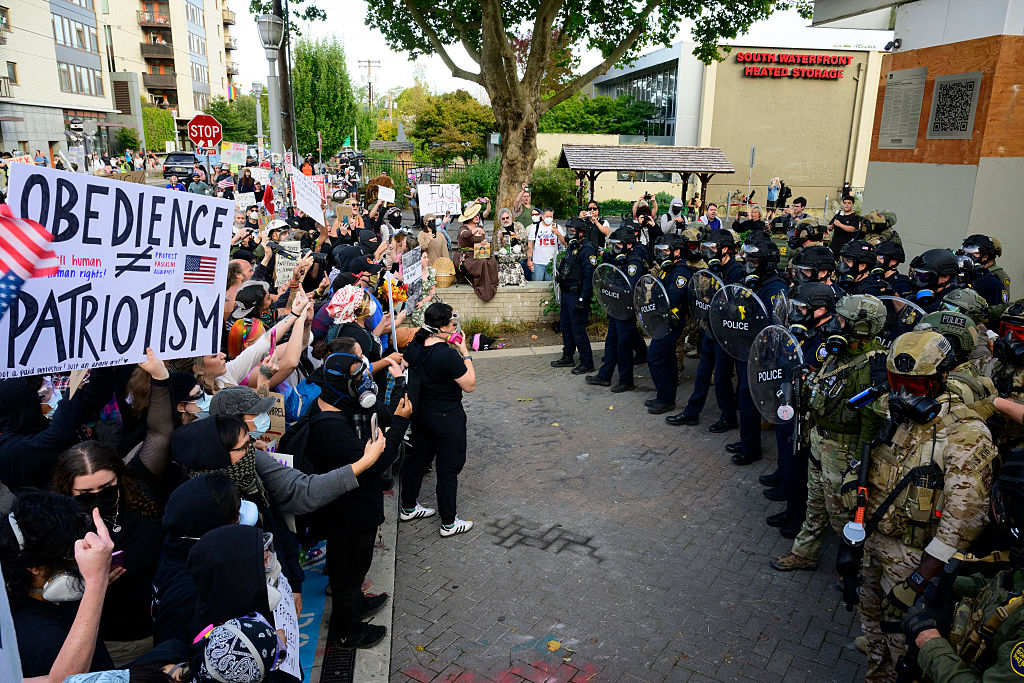President Donald Trump called Portland “war ravaged” and described Immigration and Customs Enforcement (ICE) facilities as being “under siege from attack by Antifa, and other domestic terrorists” when he announced that he was sending troops to the city.
[time-brightcove not-tgx=”true”]
His remarks come after demonstrators in Portland have gathered outside an ICE facility in Portland several times throughout the summer. But while authorities have deployed tear gas and shut down the facility for several days in response to the demonstrations, the protests have been largely peaceful.
And city data show that some of the most violent crimes, including homicides, are down significantly so far this year compared to the same period last year.
Overall, crime in Portland has gone down just slightly—by 1%—this year compared to last year, according to data released by the Portland Police Bureau’s Strategic Services Division. But some violent crimes have fallen significantly—homicides by 39%, human trafficking offenses by 26%, and vehicular manslaughters by 75%. Motor vehicle thefts have dropped by 30%, vandalisms by 7%, and burglaries by 5%.
Some offenses have seen an increase so far this year compared to the year before: Kidnappings and abductions, for instance, have gone up by roughly 50%. Arsons have climbed by 25%, and drug offenses have shot up by 226%.
The President’s announcement, in which he said he was “authorizing Full Force, if necessary,” sparked backlash from local officials, who have argued that the move is both illegal and unnecessary.
“If President Trump came to Portland today, what he would find is people riding their bikes. Playing sports. Enjoying the sunshine. Buying produce at a farmers’ market,” Portland Mayor Keith Wilson said in a statement. “In Portland, we have a long and proud tradition of large-scale peaceful protests. We have a long and proud track record of being at the forefront of positive social change.”
Oregon Gov. Tina Kotek posted photos of herself participating in a march in the city over the weekend and pushed back against Trump’s portrayal of Portland.
“Today, I was in downtown Portland walking peacefully with Oregonians to say that we don’t need military intervention here,” she said in the post. “We are peaceful. We are united. We are Oregon.”
The state of Oregon and the city of Portland announced on Monday that they had filed a lawsuit against the Trump Administration, challenging the deployment of 200 members of the Oregon National Guard to the city for up to 60 days. Wilson, along with more than a dozen other Oregon mayors, signed a joint letter that was released on Monday, rejecting any efforts to federally militarize the area.
“Enforcement of civil immigration laws by militarized forces has no legitimate role in our community, no support from local elected leaders, and little public support,” the letter said. “As regional leaders, we commit to pursuing all legal and legislative options to counter this unprecedented, unnecessary, and unwanted effort to utilize militarized forces in a manner that could violate the constitutional rights of our community.”
The President’s remarks about Portland follow similar comments he has made about several other cities—including Los Angeles; Washington, D.C; Chicago; New Orleans; and Memphis—claiming that they have a crime problem and would benefit from a federal crackdown. But data show that, overall, violent crime is down in those cities, as it is in many others across the country, after previously rising during the COVID-19 pandemic.
Trump deployed National Guard troops to Los Angeles this summer in response to protests over ICE raids in the city. Local officials objected to the move, calling it “unlawful.” While the President described the protests as “violent, instigated riots,” saying there was lots of “Violence and Destruction,” the demonstrations were largely peaceful.
Last week, a gunman opened fire at an ICE facility in Dallas, killing two immigration detainees. Trump was quick to direct blame toward “Radical Left Democrats” in the wake of the attack, though authorities have said the shooter “very likely acted alone” and that they found no evidence that he belonged to “any specific group or entity.”

